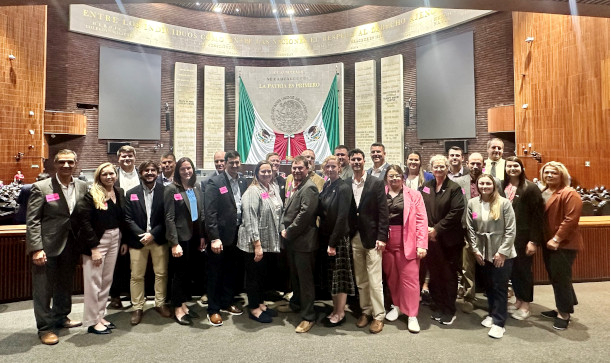Pork Leadership Institute Class Visits Mexico to Enhance U.S. Pork Trade Relations


The most recent group from the Pork Leadership Institute (PLI), a training collaboration between the National Pork Producers Council (NPPC) and the National Pork Board, completed their international program with a trip to Mexico. This trip marked the culmination of the training for the 18 PLI participants who have dedicated the past year to enhancing their leadership skills and gaining in-depth knowledge of the pork industry.
Joined by NPPC Vice President of Government Affairs Maria C. Zieba, NPPC Manager of International Affairs Cole Spain, and NPPC Manager of Producer Engagement Lucy Russell, the participants journeyed across Mexico, interacting with important government officials, pork industry leaders, and local producers. The objective was to gain a better understanding of Mexico’s role as a trade partner and the crucial significance of international trade for the U.S. pork industry.
Insights into Mexico’s Pork Industry and Economy
During their visit, the PLI class received comprehensive briefings on global pork markets, current trade regulations, and Mexico’s economic and political landscape. One of the highlights was a trip to the Chamber of Deputies, Mexico’s lower house of Congress, where participants learned about Mexico’s legislative processes and the regulations governing agricultural trade.
Furthermore, the group explored both traditional markets and modern supermarkets, observing firsthand how pork is promoted and consumed in Mexico. These visits offered valuable insights into consumer preferences and buying habits in Mexico, the largest export market for the U.S. pork industry.
Significance of Mexico to U.S. Pork Producers
Mexico remains the primary destination for U.S. pork exports, representing over 25% of total U.S. pork production last year. The close proximity, strong trade relationships, and increasing demand for high-quality pork establish Mexico as a key partner for American producers. Understanding Mexico’s pork industry, economy, and political landscape is vital for sustaining success in this important market.
Cultivating Future Pork Industry Leaders
The PLI program aims to nurture the next generation of leaders in the pork sector. Over the year, participants engage in leadership development sessions and hands-on training in various aspects of pork production, government policies, and trade relations. The international trip to Mexico is a critical aspect of the program, enabling participants to apply their leadership skills while gaining a global perspective on trade and international collaboration.
Equipped with a deep understanding of international trade complexities and the specific requirements of key partners like Mexico, these emerging leaders will play a crucial role in shaping the future of the pork industry in the U.S. As they return, they are better prepared to advocate for the industry and enhance its standing in the global market.
Future Outlook
Amidst increasing global pork demand, the U.S. pork industry must uphold strong trade ties and adapt to international market needs. Programs like the Pork Leadership Institute are essential for preparing the next generation of pork producers and industry advocates to lead in an interconnected world.
The recent Mexico trip underscores the importance of nurturing relationships with key trade partners and developing leaders who grasp the cultural, economic, and political factors influencing pork trade. The PLI participants are now armed with the necessary tools and knowledge to continue expanding U.S. pork exports success and ensuring the industry’s sustained growth and prosperity.


